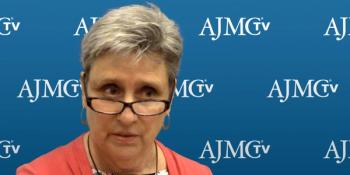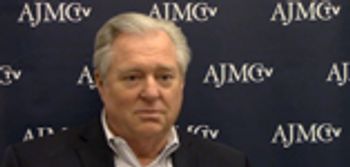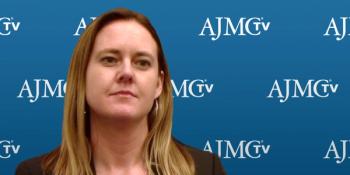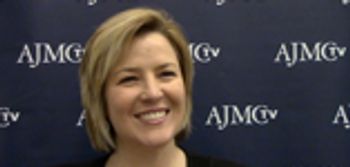
All stakeholders stand to gain from the 340B program in different ways, but they also take on different risks, like the potential impact for health plans on rebate contracts, said Neil Minkoff, MD, chief medical officer of EmpiraMed.

All stakeholders stand to gain from the 340B program in different ways, but they also take on different risks, like the potential impact for health plans on rebate contracts, said Neil Minkoff, MD, chief medical officer of EmpiraMed.

A measure developer's work isn't done once a quality measure is created-the Pharmacy Quality Alliance (PQA) works with health plans post-implementation on questions regarding measure specifications or measure calculations, explained Matthew Pickering, PharmD, RPh, associate director of research and quality strategies at PQA.

Many people may think e-prescribing refers to the electronic sending of a prescription, but the term actually encompasses a much broader range of communications and transactions, said Laura Topor, president of Granada Health.

When conducting drug trials, the values of patients and manufacturers can come into conflict, which is why a well-informed ethical framework is needed to evaluate benefits and burdens, according to Jacqueline Glover, PhD, professor in the Department of Pediatrics and the Center for Bioethics and Humanities at the University of Colorado Denver.

When using real-world data, researchers must be careful to avoid several common pitfalls that can bias their results, according to Richard J. Willke, PhD, chief science officer of ISPOR.

The Academy of Managed Care Pharmacy (AMCP) is working with Congress to improve communication both in the pre- and post-approval settings between pharmaceutical companies and payers, according to Susan A. Cantrell, RPh, CAE, CEO of AMCP.

The 340B program has evolved significantly since its passage, but there are still important changes needed, like clarifying the target patient population. The complicated rebate system for payers and drug manufacturers is also a consequence that should be addressed, said Neil Minkoff, MD, chief medical officer of EmpiraMed.

As the capabilities and benefits of e-prescribing become more widely known, states will likely continue enacting requirements to drive the uptake of this new technology, explained Doug Hillblom, PharmD, president at Arena Healthcare, LLC.

Measure developers have a number of challenges to consider when developing a new measure and getting it implemented, explained Matthew Pickering, PharmD, RPh, associate director of research and quality strategies at the Pharmacy Quality Alliance (PQA).

About 40% of new specialty drugs in 2017 are expected to be for orphan drug indications, which is keeping with the trend; however, an upcoming investigation into potential abuses of the Orphan Drug Act could have an unknown impact on development and prices, said Aimee Tharaldson, PharmD, senior clinical consultant for emerging therapeutics at Express Scripts.

With the high cost of new drugs to cure hepatitis C, ensuring that real-world outcomes are consistent with those seen in clinical trials is important, explained Gail Bridges, PharmD, of Accredo Health. She explained that Accredo ensured patients adhered to hepatitis C drugs in order to get the best outcomes through a disease- and drug-specific education program.

Findings from real-world studies will help clinicians and other health stakeholders better understand the use of Toujeo compared with Lantus, particularly regarding treatment dosage patterns, for patients with type 2 diabetes, according to Liz Zhou, MD, director of evidence-based medicine at Sanofi Medical Affairs.

According to Richard J. Willke, PhD, chief science officer of ISPOR, real-world data has some unique advantages over randomized clinical trial findings, especially for health plans looking to make coverage decisions.

Although it may be costly to negotiate and implement risk-based arrangements, these agreements are a valuable tool for testing outcomes in the real world among complex patients, explained Lou Garrison, PhD, professor emeritus in the Department of Pharmacy, University of Washington.

As healthcare moves more toward a system of value-based care, ethical committees are becoming more important to ensuring an institution's ethical values are evident in the way it provides care to patients, explained Jacqueline Glover, PhD, professor in the Department of Pediatrics and the Center for Bioethics and Humanities at the University of Colorado Denver.

Susan A. Cantrell, RPh, CAE, CEO of the Academy of Managed Care Pharmacy (AMCP), discusses the biggest concerns and opportunities facing members of AMCP during this time of legislative and regulatory uncertainty and rising costs in healthcare.

The first drugs for nonalcoholic steatohepatitis (NASH) won't be approved until 2019 at the earliest, but with 16 million Americans affected and another 6 million to 10 million at high risk, the market could be expensive and it's worth keeping an eye on, said Aimee Tharaldson, PharmD, senior clinical consultant for emerging therapeutics at Express Scripts.

As the use of e-prescribing expands, it will begin to encompass more than just writing an initial prescription to include many interactions between healthcare providers, according to Doug Hillblom, PharmD, president at Arena Healthcare, LLC.

The Pharmacy Quality Alliance (PQA) heavily relies on member organizations throughout the development and implementation of new quality measures, explained Matthew Pickering, PharmD, RPh, associate director of research and quality strategies at PQA.

Richard J. Willke, PhD, chief science officer of ISPOR, previews the discussions at the ISPOR 22nd Annual International Meeting, which will be held May 20-24 in Boston, Massachusetts, including topics on the future of health policy in the United States and social networking interventions.

Real-world results for hepatitis C drugs have been very closely aligned to the clinical trial outcomes, which is likely due to a combination of factors, such as the effectiveness of the agents and better knowledge of using direct-acting antivirals, according to Gail Bridges, PharmD, of Accredo Health.

The market for tardive dyskinesia, a movement disorder affecting 500,000 patients in the United States, will go from zero approved treatments to 2 in 2017, making it an important area to watch, said Aimee Tharaldson, PharmD, senior clinical consultant for emerging therapeutics at Express Scripts.

With a new administration in the White House and the issue of repealing or replacing the Affordable Care Act not completely addressed, managed care pharmacists should feel heartened to know their voices and concerns are being heard, said Susan A. Cantrell, RPh, CAE, CEO of the Academy of Managed Care Pharmacy.

Panelists, during a session on value and value-based reimbursement at the Academy of Managed Care Pharmacy Annual Meeting, held March 27-30 in Denver, Colorado, discussed the benefits and challenges of value-based contracting and the current and evolving use of value frameworks.

Since the Republican bill to repeal and replace Obamacare never made it to a vote, insurers are still very uncertain about the future of healthcare. At this time it is unclear whether Republicans plan to shore up the law or actively undermine it.

Richard Mullvain, RPh, BCPS (AQC), CCCC, a cardiovascular clinical pharmacist and expert in cardiovascular care at the Essentia Health Heart & Vascular Center in Duluth, Minnesota, delivered a focused clinical review on the topic of the PCSK9 inhibitor Repatha (evolocumab), and its impact on low-density lipoprotein cholesterol (LDL-C).

At the Academy of Managed Care Pharmacy Annual Meeting in Denver, Colorado, Kevin C. Maki, PhD, CLS, FNLA, FTOS, FACN, of Midwest Biomedical Research/Center for Metabolic and Cardiovascular Health in Chicago, Illinois, discussed methods of quantifying treatment effects in cardiovascular outcomes trials.

Rates of e-prescribing access is higher among pharmacists than physicians, which is partly due to older physicians at the end of their career who find implementing the system cost prohibitive, explained Doug Hillblom, PharmD, president at Arena Healthcare, LLC.

During an industry workshop at the Academy of Managed Care Pharmacy Annual Meeting in Denver, Colorado, Cliff Goodman, PhD, of the Lewin Group, moderated a session that provided a health economic case study on cardiovascular outcome data for Repatha (evolocumab), the PCSK9 inhibitor from Amgen.

New targeted therapies reduce waste and identify patients that will benefit most, but their high price tags have left the healthcare industry scrambling to figure out how to pay for these treatments and cures.

259 Prospect Plains Rd, Bldg H
Cranbury, NJ 08512
© 2025 MJH Life Sciences®
All rights reserved.
